

Cracks In The Wall: Beyond Apartheid Palestine/Israel
Ben White
After decades of occupation and creeping annexation, Israel has created an apartheid system in historic Palestine. Peace efforts have failed because of one hard truth: the best Israeli offers do not meet the minimum that a truly free Palestine would require - nor that international law would recognize. There are, however, widening cracks in Israelis traditional pillars of support for this policy, and in this book Ben White lays them out. Opposition to Israeli policies, he shows, are growing within Jewish communities and among Western progressives, while the rise of populist movements around the world has confused traditional party lines on the question and the Palestinian-led boycott campaign continues to gain momentum. Now, White argues, is the time to plot a course to avoid the mistakes of the past - to create a real way forward, and beyond apartheid, in Palestine.

Affective Archives: An Evening of Experimental Palestinian Film
Discussion Moderated by Prof. Gil Hochberg
Department of Middle Eastern, South Asian, and African Studies
Films
Interrupted Biographies
Mirna Bamieh
The film is a visitation to incidents in Bamieh's family history, that occurred in Beirut, Jerusalem and other parts of the world. Where the ever-shifting film consists of footage from a home-video tape that was filmed in Beirut in 1996. It is an attempt to highlight an almost forgotten period of history, through personal narrative.
The White Elephant
Shuruq Harb
An experimental video loosely based on the adventures of a Palestinian teenager coming to grips with her angst within the political climate of the Oslo Accords in Palestine in the 1990s. Narrating a story of lies amongst thieves, the confessional and at times darkly humorous video projects a confrontational gaze onto the landscape through acts that transgress political boundaries and explore personal desires.
A Magical Substance Flows Into Me
Jumana Manna
The film weaves through musical traditions of a multitude of communities living in and around Jerusalem. It takes as its starting point German-Jewish ethnomusicologist Robert Lachmann’s field recordings of ‘Oriental’ groups in Palestine in the 1930s and his Oriental Music radio series made for the Palestinian Broadcasting Service; established under the British Mandate (1920-1948). Responding to Lachmann’s project, Manna revisits the communities that he studied–including Kurdish, Moroccan, and Yemenite Jews, Samaritans, members of urban and rural Palestinian communities, Bedouins and Coptic Christians–replaying his recordings and making new recordings of her own. These exchanges take place in their homes, offices, recording studios, and places of worship, and are interspersed with scenes from her own family home in East Jerusalem. Weaving from one site to another, the intertwinement of heritage and identities are presented, along with the imagining of a multifaceted Palestine.

Companions In Conflict: Animals in Occupied Palestine
Penny Johnson
In August of 2016, Israeli police officers arrested a Palestinian donkey in the Jordan Valley. The charge? Not having the correct paperwork. It's an image as sad (and strangely common) as it is symbolic: No creature great or small is free from the absurdities of the Occupied Territories.
Drawing on three decades of living in the region, Penny Johnson's insightful writing reveals what these and many other animals' fates tell us about the current state of Israel and Palestine. What's more, looking forward, she introduces a new generation of environmental activists to us, who represent the region's best hope for conservation, collaboration, and justice for all creatures.

Permanent Occupation? Human Rights in Israel/Palestine in the Trump/Netanyahu Era
Omar Shakir
Israel and Palestine Director at Human Rights Watch, investigates human rights abuses in Israel, the West Bank, and Gaza. Prior to his current role, he was a Bertha Fellow at the Center for Constitutional Rights, where he focused on US counterterrorism policies, including legal representation of Guantanamo detainees. As the 2013-14 Arthur R. and Barbara D. FinbergFellow at Human Rights Watch, he investigated human rights violations in Egypt, including the Rab’a massacre, one of the largest killings of protesters in a single day. A former Fulbright Scholar in Syria, Omar holds a JD from Stanford Law School, where he co-authored a report on the civilian consequences of US drone strikes in Pakistan as a part of the International Human Rights & Conflict Resolution Clinic, an MA in Arab Studies from Georgetown University’s School of Foreign Affairs, and a BA in International Relations from Stanford.


Electrical Palestine: : Capital and Technology from Empire to Nation
Electricity is an integral part of everyday life—so integral that we rarely think of it as political. In Electrical Palestine, Fredrik Meiton illustrates how political power, just like electrical power, moves through physical materials whose properties govern its flow. At the dawn of the Arab-Israeli conflict, both kinds of power were circulated through the electric grid that was built by the Zionist engineer Pinhas Rutenberg in the period of British rule from 1917 to 1948. Drawing on new sources in Arabic, Hebrew, and several European languages, Electrical Palestine charts a story of rapid and uneven development that was greatly influenced by the electric grid and set the stage for the conflict between Arabs and Jews. Electrification, Meiton shows, was a critical element of Zionist state building. The outcome in 1948, therefore, of Jewish statehood and Palestinian statelessness was the result of a logic that was profoundly conditioned by the power system, a logic that has continued to shape the area until today.

Hamas Contained: The Rise and Pacification of Palestinian Resistance
Dr. Baconi discusses his new book Hamas Contained: The Rise and Pacification of Palestinian Resistance (Stanford University Press, 2018). The book offers the first thirty-year history of the group, drawing on interviews with organization leaders and publications from the group. It maps Hamas's transition from fringe military resistance towards governance and shows how, under Israel's approach of managing rather than resolving the conflict, Hamas's demand for Palestinian sovereignty has effectively been neutralized by its containment in Gaza.











